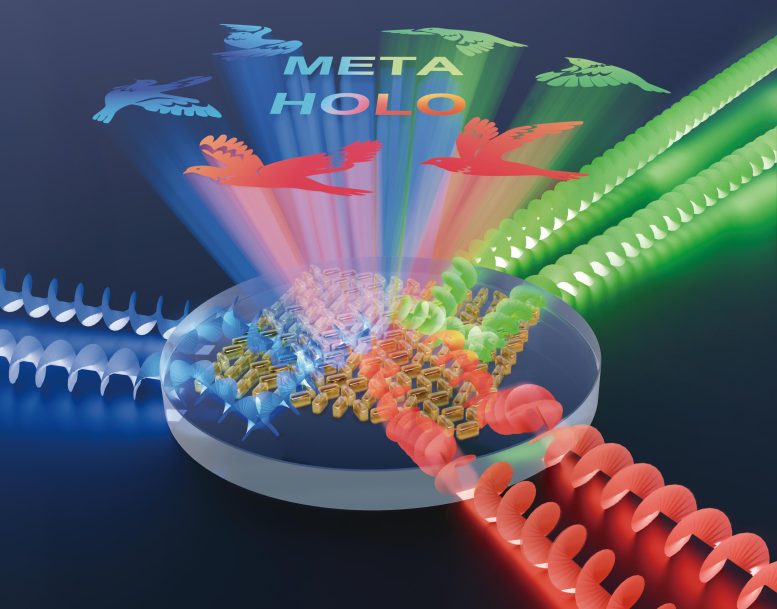“Metaholograms” – Scientists Have Developed a New, Better Type of Hologram

By

Researchers have developed “metaholograms,” a new type of hologram that can project multiple high-fidelity images without crosstalk, potentially revolutionizing AR/VR displays and other technologies. These metaholograms, which offer higher resolution and wider viewing angles, use an innovative k-space translation design strategy and geometric phase encoding to eliminate inter-channel crosstalk and increase information capacity. Depending on the azimuthal angle and polarization state of guided incident light, the metahologram can selectively project six independent single-color images or two full-color images. Credit: Zeyang Liu, Hao Gao, Taigao Ma, Vishva Ray, Niu Liu, Xinliang Zhang, L. Jay Guo, and Cheng Zhang
New “metaholograms” could transform AR/VR technologies by enabling crosstalk-free, high-fidelity image projection with vastly increased information capacity.
Researchers have developed a new type of holograms, known as “metaholograms,” capable of projecting multiple high-fidelity images free of crosstalk. This innovation opens doors to advanced applications in virtual and augmented reality (AR/VR) displays, data storage, and image encryption.
Metaholograms offer several advantages over traditional holograms, including broader operational bandwidth, higher imaging resolution, wider viewing angle, and more compact size. However, a major challenge for metaholograms has been their limited information capacity which only allows them to project a few independent images. Existing methods typically can provide a small number of display channels and often suffer from inter-channel crosstalk during image projections.
Innovative Research Approach
To overcome this limitation, the new research introduces an innovative approach based on the k-space translation design strategy, enabling multiple target images to seamlessly switch between “displayed” and “hidden” states.

(a) Schematic diagram of the experimental system for single-color imaging. (b) Experimental results of the waveguide-based six-channel metahologram. Six crosstalk-free holographic images (capital letters “A” to “F”) are selectively projected when the metahologram is illuminated by a guided incident light with different azimuthal angles (0°, 60°, and 120°) and spin states (right circular polarization and left circular polarization). Credit: Zeyang Liu, Hao Gao, Taigao Ma, Vishva Ray, Niu Liu, Xinliang Zhang, L. Jay Guo, and Cheng Zhang
The proposed metahologram employs the geometric phase encoding method and consists of millions of subwavelength-scale poly-silicon nanopillars, each measuring approximately 100 nm, all identical in size but with spatially varying rotation angles.
The device further incorporates a planar glass waveguide to convey incident light and leverages properties such as polarization and angle to switch the projection of up to six unique high-fidelity images without crosstalk.
Potential Applications and Future Implications
Additionally, the researchers have created a two-channel full-color metahologram and even an eighteen-channel metahologram using a combination of different multiplexing techniques.

(a) Schematic diagram of the experimental system for full-color imaging. (b) Experimental results of the waveguide-based full-color metahologram. Two crosstalk-free full-color holographic images (“lilac” and “rose”) are selectively projected when the metahologram is illuminated simultaneously by red, green, and blue guided incident lights all having right circular polarization or left circular polarization. Credit: Zeyang Liu, Hao Gao, Taigao Ma, Vishva Ray, Niu Liu, Xinliang Zhang, L. Jay Guo, and Cheng Zhang
This innovation has the potential to significantly improve AR/VR displays by enabling the projection of more complex and realistic scenes. It also holds promise for applications in image encryption, where the information is encoded into multiple holographic channels for enhanced security.
The research is a significant step forward in developing high-performance metaholograms with a vastly increased information capacity. This study paves the way for exciting new possibilities in various fields, from advanced displays to information encryption and information storage.
Reference: “Broadband spin and angle co-multiplexed waveguide-based metasurface for six-channel crosstalk-free holographic projection” by Zeyang Liu, Hao Gao, Taigao Ma, Vishva Ray, Niu Liu, Xinliang Zhang, L. Jay Guo and Cheng Zhang, 29 May 2024, eLight.
DOI: 10.1186/s43593-024-00063-9


